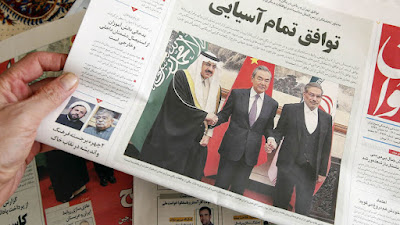First of all, I think I should state that I welcome this agreement wholeheartedly. The China-Saudi-Iran deal is an immensely positive first step for peace in the Middle East. Just getting the Saudis and the Iranians to talk to each other, and agree to mutually reopen diplomatic relations with each other, is an immense feat of diplomacy, one in which the Chinese Foreign Ministry can take justifiable pride.
It’s a necessary first step: however, it is precisely that—a first step. Opening diplomatic talks does not, by itself, resolve the numerous issues that havearisen between Iran and Saudi Arabia. Not least of these is the bloodletting and the atrocities against civilians for which the Saudis and the Emiratis are guilty in Yemen. Very notably, the Houthi movement in Yemen has responded with great scepticism to the deal and prospects for future peace. Speaking for myself, I can’t blame the Houthis for their stance. The Saudis are inordinately responsible for the human suffering in Yemen, and have a long way to go before they can be considered a reliable party in the peace process there.
Yemen is a key strategic priority for China’s economic planning, however, given that it lies on the Maritime Route in the Belt and Road Initiative. One of the reasons that China was able to broker such a deal in the first place, is that it carefully threaded a policy of neutrality on the southern Arabian Peninsula, and took great care not to align itself too closely either with the Houthis or with the Saudis. This neutral policy was largely driven by a realisation that China needs both Saudi and Yemen in order to make the Maritime Route work.
Necessary for China’s economic goals though it may be, because this deal is a first step, subsequent steps will be fraught with complications. One of those complications will be Yemen, and brokering a just peace there. Another of those complications will be the various proxy conflicts in the region on which Iran and Saudi Arabia have aligned on opposing sides—especially in Iraq, Syria and Lebanon. In Iraq and Syria, Iran is supportive of the legitimate governments in both countries, while the Saudis have attempted to use various violent non-state actors (the Kurdish militias in Iraq, or the Free Syrian Army and Tahrir al-Sham in Syria) to undermine both governments. Iran has supported the government of Lebanon, while Saudi Arabia has largely opposed it.
Another very likely source of complication to the deal comes from the United States and Israel. Israel has been assiduously courting the Saudi government for decades as a possible partner against Iran. If Saudi Arabia establishes peaceful relations with Iran, it obviously creates complications for Israel’s war plans; as a result, it is very likely that Israel will attempt to delay through diplomatic channels, or sabotage through covert actions, the further implementation of the deal.
The United States government is opposed to the deal for different reasons, seeing the Belt and Road Initiative as a threat to its military and diplomatic hegemony. Reading some of the reactions to it from state-aligned media, the overall reaction has been one of surprise and dismay. In many cases there seems to be a tenor that China has somehow reneged on or broken its promises; however, this seems to be an objection made out of chaff. China never promised to keep out of diplomacy, only not to interfere in the internal politics of its partner countries. In any event, this deal could be justified as being in China’s economic interests.
Honestly, though, I don’t think the American public needs to be worried about this at all. If a Saudi-Iranian deal impacts us, it will be in a positive way. A drawdown of Saudi campaigns against Iran in the Middle East is likely to diminish the possibility of violent terrorism against American civilians.


No comments:
Post a Comment